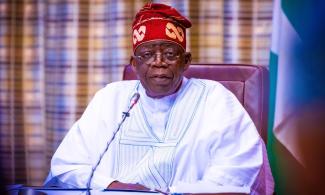
NEFGAD in a six-point position paper presented to President Bola Tinubu and other relevant institutions on Tuesday and signed by its Head of Office, Mr Akingunola Omoniyi, warned the Federal Government against bowing to external pressure capable of undermining and derailing the successes recorded by the Public Procurement Act implementation in the last 17 years.
The Network for the Actualisation of Social Growth and Viable Development (NEFGAD), a public procurement advocacy group, has faulted a World Bank comment/recommendation on the Draft Public Procurement Bill 2023.
NEFGAD in a six-point position paper presented to President Bola Tinubu and other relevant institutions on Tuesday and signed by its Head of Office, Mr Akingunola Omoniyi, warned the Federal Government against bowing to external pressure capable of undermining and derailing the successes recorded by the Public Procurement Act implementation in the last 17 years.
NEFGAD in the position paper titled: ‘Harmonized National Procurement Stakeholders and Citizens’ positions on Draft Public Procurement Bill 2023’ says “a peer review and fitness test conducted on various comments and recommendations particularly from the World Bank against other country’s public procurement regulations across the globe suggests that they are merely hypothetical without detail consideration of the country’s peculiar challenges and yearnings of the people, hence, the need to be mindful, in order not to allow the country to be used as testing ground for regulations capable of disrupting smooth operations of the country’s public procurement system”.
The World Bank has recommended the stripping of the Bureau of Public Procurement (BPP) of its regulatory power of issuing certificates of ‘No Objection’ to contracts.
The bank in one of its comments on the Draft Public Procurement Bill 2023 termed the exercise as operational and not regulatory, hence, recommended it to be transferred to Ministries Departments and Agencies (MDAs).
Akingunola said that the recommendation if adopted by the Federal Government would automatically revert the country to the Tenders’ Board/ pre-procurement reform era where everything relating to contracts started and ended with the MDAs.
It said it was the scorn and disdain caused by such “obnoxious, inefficient and grossly ineffective practices of the ministerial and extra-ministerial tenders’ board that informed the procurement reform in the first place”.
He further emphasised that “Public Procurement is the life wire of public governance and the main channel through which governments serve the people, saying it constitutes over 99 percent of the entire government spending, hence any framework around its operations must be guarded jealously and seek the input of the people it intends to serve”.
“The World Bank’s position recommending the transferring of such an important mechanism to corruption-proliferate MDAs is not only discouraging but contradictory and suspicious, claiming the World Bank in its budget support and loan agreements has prior and post review mechanism of issuing No Objection certificate-based approvals to Nigeria as of today.”
It said the World Bank should not have recommended such to the country without first adopting it.
He also maintained that “the appointment of the President or the Minister of Finance and Coordinating Minister for the economy as a member of National Procurement Council, in addition to the President’s/Ministers’ enormous power as conferred by the constitution and other extant laws is more than enormous enough to conflict, overwhelm and distract the president and the Finance Minister from performing their functions as the head of a body as sensitive and regulatory as National Procurement Council”.
Akingunola said, “Appointment into public procurement offices should be reserved strictly to core procurement professionals through competitive selections as currently outlined in the PPA, not through the backdoor and or on the basis of political patronage, as political interference has been the bane of the successful implementation of the PPA.
“NEFGAD frowned on a situation whereby the Federal Executive Council (FEC) sits to award contracts, arguing that with Nigeria’s complexities and challenges of development, the country tends to benefit more by taking contract matters off the agenda of FEC, saying Presidents in other climes only sit to discuss policies not contracts. The Procurement Council should rather be saddled with such responsibility of vetting and awarding contracts. Approval thresholds for contracts should also be reviewed to give more responsibilities to the NCPP he concluded.”